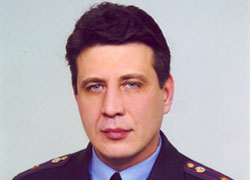Sensation: police lieutenant colonel tells how elections are rigged in Belarus
Ballot boxes are sealed in a way that it is a child’s play to move this seal and throw in false ballots.
This story took place two years ago, on the last day of the early vote during the election to the Chamber of Representatives of the National Assembly of Belarus. Lieutenant colonel of police Mikalai Kazlou was on duty at a polling station in Minsk. He witnessed the rigging of elections. Mr. Kazlou told Narodnaya Volia why he had been keeping silent for two years and how his life changed after the parliamentary election.
‘What you are offering is a crime’
- In the evening of 27 September 2008, the last day of the early voting, being an officer of the criminal investigation department of Central district of Minsk, I started my night watch at the polling station #463 of Staravilenski precinct #105. The election commission was still working, though there were almost no voters there already who wanted to cast their ballot in advance.
The chairperson of the commission invited me to her room for conversation. She told about the time and procedure of the ending of the commission’s work, and that after the closing of the polling station I would be given the keys, and the security system should be activated in the premises where ballot boxes for early vote stand. And at the end of our conversation she said in a confidential tone that after observers’ going away I must give the keys back to her, as she needs to throw in some ballot papers in support of the official ruler. It became clear from her explanation that the number of people who had taken part in the early vote was too little, or much less than expected, and there were doubts that not many of them preferred ‘the right’ candidate.
I was struck dumb by such an offer. My reaction was not the one she expected.
- As long as I am here, it is impossible. What you are offering is a crime. You want to commit a crime and are offering me to become an accomplice. It is out of question.
At 8 p.m. the chairperson of the commission, according to the established order, closed the room where ballot boxes were kept, and gave keys for keeping to me. Observers left the poling station. But three members of the commission stayed at the polling station, situated in a secondary school.
After a while the chairperson came up to me and asked to give the keys. I answered that I could not give the keys, especially after our conversation when she told about her plans. I asked: ‘How are you going to throw in ballot papers when ballot boxes are sealed?’
- Do not worry, they are sealed in such a way that it’s a child’s play to move the seal a little, and then return it back.
I certainly didn’t give the keys. And she went away to make a phone call.
- Why are you impeding the work of the election commission? – It was one of my direct commanders, deputy chief of the police department of Central district. He gave a severe rating to me: give the keys immediately, he said, do what you are told to do, and so on.
- I know that members of the election commission want to throw in ballot papers into the ballot boxes, so I cannot give them the keys, — I tried to remain calm despite of his angry outburst.
- It’s none of your business… I order you to give her the keys. The chair of the commission had left some documents in the room and needs to take them out of there.
After being given a direct order I had to obey.
In about 7 minutes three (!) members of the commission entered the room with the ballot-boxes. After some time I opened the door and saw all three of them standing near the ballot-box and throwing ballot-papers there. It was a rather big stack.
I immediately called my commander and stated:
- I report that a moment ago before my eyes ballot papers were thrown into the ballot boxes.
- It’s none of your business, — he answered. – We’ll have debriefing tomorrow.
In the morning one of my colleagues called me. The first thing he asked about was: ‘Mikalai, what has happened?’ and told that at the morning briefing meeting in presence of a considerable number of officers, commanders earnestly discussed what should be done to me: should they open a criminal case against me, or should I be sent to a mental hospital, as according to them I hindered the work of the commission.
As soon as I arrived home, I received a phone call. I was summoned to the Main bureau of Internal Affairs of the Minsk City Executive Committee. They even sent a car to pick me up.
On arriving there I was invited to the office of the head of the Main bureau, Leanid Farmahei. There were also the head of the Tsentralny District Police Department of Minsk Vital Siniakou and some representative of the presidential administration or the Interior Ministry, a top level official, in his office.
To put it short, when everything became clear, they started to persuade me (though their persuasions were very much like demands) to make a statement on Belarusian TV and disprove the reports which emerged on the web and write a report about that. I flatly refused.
According to the procedure they were to summon me to an investigative agency for an official interrogation, and I hoped naively that it will be like that. However, I have to say that no examination has been held - at least I’ve heard nothing about such examination to this day.


















